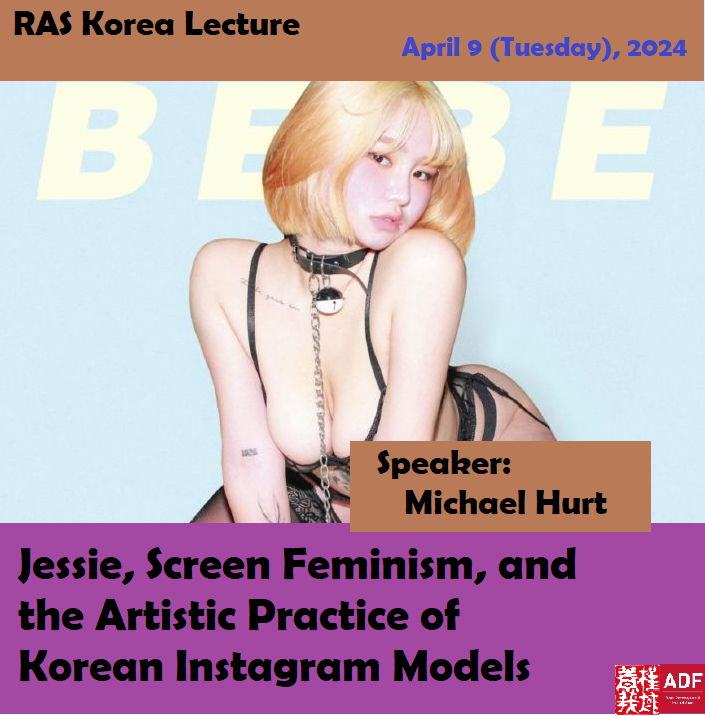Sharing the lecture held on April 9, 2024.
Jessi, Screen Feminism, and the Artistic Practice of Korean Instagram Models
SPEAKER: Dr. Michael W. Hurt
SUMMARY:
The last few years has seen the rise of the popularity of street dance performance as marked by the explosion of K-POP cover dance across the globe, and this, along with the 2021 television phenomenon Woman Street Fighter and the rise of “self-producing idols” in 4th-gen K-POP, has led to a rise in the number of cultural products that are part of a wave of home-grown, Korean-style “screened feminism” that must operate under semiotic cover, using the plausible deniability of the bukae (“sub-character,” or alter-ego) in the name of art to not be accused of being a western-style “feminist.” This can be understood by employing the concept of a “complaisant agency” that, like “docile agency,” encompasses the use of accepted aesthetics within a field in which one cannot mount formal, visible resistance, while feigning compliance or complicity in order to perform defiant acts of art. It is through the headfake of “complaisant agency” that performers can stage cultural productions that are seemingly complicit in master narratives of subjugation but yet contain Trojan horses that explode with the potential to mount resistance and become a place to transgress.
.
BIO:
Michael W. Hurt, PhD, is a photographer and professor living, shooting, and researching in Seoul. He received his doctorate from UC Berkeley’s Department of Comparative Ethnic Studies. He also started Korea’s first street fashion blog in 2006 and published the first English language book about Korean fashion in 2009. He researches youth, street fashion, and digital subcultures in Seoul while lecturing on cultural theory and art history at the Korea National University of the Arts. He was the first researcher to focus on Korea’s street fashion hyperculture and has been shooting and publishing through it since 2007. His present research focuses on using the camera to access and document emergent digital subcultures in Korea, including the political economy of the “pay model” on Korean Instagram, Seoul’s drag underground, and the youth-centric LGBTQ movement in Korea. His work is visual sociology in that he applies ethnographic analyses, centering the camera and visuality, to the youth cultures and communities that also tend to form precisely around such visual images and digitally enabled social spaces. He also does cultural consulting on Korea for companies from Google to Pinterest, from P&G to Meta, and continues such research that coheres around his ethnographic photography.


![[Lecture Video Archive] ‘The North Korean workers in Russia’ by Andrei Lankov](http://raskb.com/wp-content/uploads/2024/03/Lecture_Lankov_20240326_2-1-500x383.png)
![[Lecture Video Archive] ‘도시탐험: Korea’s developing urban exploration community’ by Jon Dunbar](http://raskb.com/wp-content/uploads/2024/02/poster-500x383.png)
![[Lecture Video Archive] ‘My 인연 with a 한옥’ by AnnA Cybele Paschke](http://raskb.com/wp-content/uploads/2024/02/Cybele-Take-2-500x383.png)
![[Lecture Video Archive] ‘Experimental Artists Confront Conformity in Seoul, 1968-70’ by Matt VanVolkenburg](http://raskb.com/wp-content/uploads/2023/12/VanVolkenburg_20240116-500x383.png)
![[Lecture Video Archive] ‘Saving Confucius from Confucianism’ by Prof. Werner Sasse](http://raskb.com/wp-content/uploads/2023/10/Sasses-Confucianism-500x383.png)